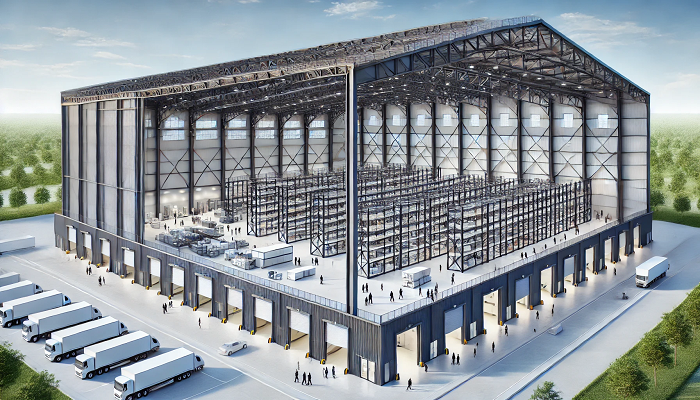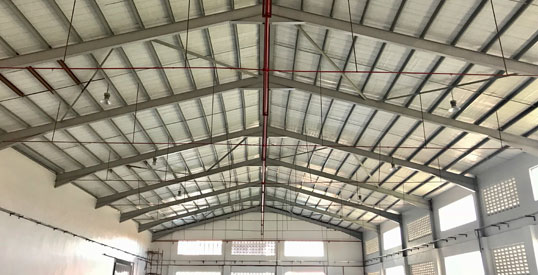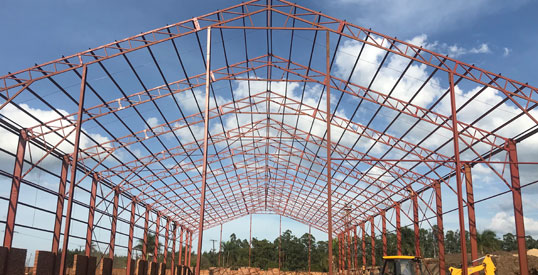Prefab Warehouse for Different Industrial Applications in South Sudan

As South Sudan continues to develop its industrial and commercial sectors, the need for efficient and cost-effective storage solutions is on the rise. Prefabricated warehouses are becoming an increasingly popular option for businesses that require flexible, durable, and quickly installed storage facilities. Whether it’s for manufacturing, agriculture, or oil and gas, prefab warehouses offer an ideal solution for industries in South Sudan.
In this article, we will explore the benefits of prefab warehouses across key cities in South Sudan, including Juba, Malakal, Wau, Bor, Yei, Bentiu, Aweil, Rumbek, Torit, and Nimule.
What is a Prefab Warehouse?
A prefab warehouse, or prefabricated warehouse, is a structure where the majority of its components are manufactured off-site and then assembled on-site. These warehouses often use steel frames and other durable materials to create strong, versatile structures that can be built quickly and cost-effectively.
Unlike traditional warehouses, which require extensive on-site construction, prefab warehouses are delivered in modules, making the process much faster and easier. This is particularly important in regions like South Sudan, where infrastructure development is ongoing, and quick construction is crucial to keeping up with industrial demand.

Benefits of Prefabricated Warehouses for Industrial Applications
Cost-effective Construction
Prefab warehouses typically cost less than traditional warehouses due to their streamlined manufacturing process. The use of steel frames, which can be mass-produced, reduces material waste and lowers labor costs.
Faster Installation
Since prefab warehouse components are pre-manufactured, the construction time is significantly reduced. This allows businesses to start using their facilities faster, leading to quicker returns on investment.
Flexibility in Design
Prefab warehouses can be customized to meet the specific needs of various industries. Whether you need a large open floor plan or multiple sections for storage, prefab designs can be adapted to suit your requirements.
Durability and Strength
Prefab warehouses, particularly those made with steel frames, offer excellent durability and resistance to harsh environmental conditions. This is especially important in South Sudan, where varying weather conditions require sturdy, long-lasting structures.
Industries That Can Benefit from Prefabricated Warehouses
Prefabricated Warehouses for Manufacturing Industry
Prefab warehouses are perfect for manufacturing companies that need large spaces to house machinery, equipment, and products. These warehouses offer the flexibility to scale up operations as needed.
Prefabricated Warehouses for Agriculture
For South Sudan’s booming agricultural sector, prefab warehouses are ideal for storing crops, livestock feed, and equipment. They can also be equipped with cold storage facilities for perishable goods.
Prefabricated Warehouses for Logistics and Transportation
As South Sudan develops its trade routes, prefab warehouses are essential for logistics companies needing reliable storage along key transport corridors.
Prefabricated Warehouses for Oil and Gas
Given South Sudan’s wealth in oil reserves, prefab warehouses are highly useful for storing oil equipment and machinery, particularly in cities like Malakal and Bentiu.

Prefab Warehouse Solutions for Juba
Juba, the capital city of South Sudan, is a hub of industrial activity. Prefabricated warehouses are in high demand here, serving industries ranging from manufacturing to logistics. In particular, businesses in the manufacturing sector rely on prefab warehouses to store raw materials and finished goods efficiently.
Prefab Warehouse Setup in Malakal
Malakal is an important city for South Sudan’s oil industry, and prefab warehouses are critical for supporting this sector. These warehouses can be used to store drilling equipment, oil pipes, and other heavy machinery necessary for oil extraction and transportation.
Prefab Warehouse Opportunities in Wau
Located in the Western Bahr el Ghazal region, Wau is a key agricultural hub. Prefab warehouses in Wau are primarily used for storing crops, agricultural tools, and livestock feed. They provide the storage space farmers need to scale their operations efficiently.
Industrial Warehousing Needs in Bor
Bor is strategically located near the White Nile River, making it an important center for trade and transport. Prefab warehouses here can be used by transportation companies for storing goods in transit and by local industries for their production and distribution needs.
Prefab Warehouse Applications in Yei
Yei, with its proximity to the borders of Uganda and the Democratic Republic of Congo, is a major trade town. Prefab warehouses in Yei are ideal for traders needing storage facilities for imported goods and locally manufactured products.
Prefab Steel Warehouses in Bentiu
Bentiu is the center of South Sudan’s oil production activities. Steel frame warehouses are particularly suited to Bentiu’s industrial landscape, offering the durability needed to store heavy oil extraction equipment and materials.
Prefab Warehouse Growth in Aweil
Aweil’s proximity to the Sudanese border makes it a key player in cross-border trade. Prefabricated warehouses in this area provide storage solutions for goods being imported and exported between the two countries.
Prefab Warehouse Setup in Rumbek
Rumbek, located in Lakes State, is an agricultural hub. Prefab warehouses are important for storing livestock, produce, and agricultural equipment, helping farmers maintain the quality of their goods and scale their operations.
Prefab Warehouse Solutions in Torit
As Torit continues to grow industrially, prefab warehouses are becoming essential for businesses in the food and beverage sectors. These warehouses can be equipped with refrigeration units for cold storage, ensuring that perishable goods remain fresh during storage.
Prefab Warehouses for Border Trade in Nimule
Nimule is South Sudan’s busiest border town, connecting the country to Uganda. Prefabricated warehouses in Nimule are vital for managing the flow of goods across the border, providing efficient storage solutions for importers and exporters alike.

Key Considerations for Prefabricated Warehouse Setup in South Sudan
When setting up a prefab warehouse in South Sudan, several factors need to be considered:
- Land Acquisition and Zoning: It’s essential to secure land that is properly zoned for industrial use.
- Licensing and Permits: Businesses must acquire the necessary permits and approvals from local authorities.
- Access to Materials and Contractors: It’s important to ensure that steel and other materials are readily available and that skilled contractors are on hand for installation.
Steel Frame vs. Traditional Warehouse Construction in South Sudan
Steel frame warehouses offer several advantages over traditional warehouse construction, including faster installation, lower maintenance, and greater durability. These benefits make them particularly well-suited for South Sudan’s developing industrial landscape.
Cost Factors in Prefabricated Warehouse Construction
The cost of a prefabricated warehouse depends on several factors, including the size, location, and complexity of the design. However, prefab warehouses tend to be more cost-effective in the long run due to lower construction times and reduced labor costs.
Conclusion
Prefab warehouses are playing a crucial role in the industrial growth of South Sudan. Whether in Juba, Malakal, Wau, or any other key city, these structures provide flexible, durable, and cost-effective solutions for businesses across various industries. As South Sudan continues to grow economically, prefab warehouses will be integral in supporting its industrial and logistical needs.
FAQ About Prefab Warehouse
How long does it take to construct a prefab warehouse?
Prefabricated warehouses typically take a few weeks to a few months to construct, depending on the size and complexity of the design.
What are the major advantages of prefab warehouses for industrial use?
Prefab warehouses offer faster construction, cost savings, flexibility in design, and durability.
Are prefab warehouses durable enough for South Sudan’s climate?
Yes, prefab warehouses, especially those with steel frames, are highly durable and can withstand the varying weather conditions in South Sudan.
Can prefab warehouses be expanded or modified?
Yes, prefab warehouses are flexible and can be easily expanded or modified to meet changing business needs.
What industries in South Sudan benefit most from prefab warehouses?
Industries such as manufacturing, agriculture, oil and gas, and logistics benefit the most from prefab warehouses in South Sudan.
- Ready-to-Assemble Steel Structure to Sudan for the United Nations – Case Study
- Which Steel Cable Tray Type is Best? A Look at Perforated, Ladder, Wire Mesh & Flexible Trays
- The Impact of Temperature Variations on Cold Storage Warehouses in Different Cities of Uganda
- The Impact of Factory Shed Layout on Workflow Efficiency
- Uganda’s Rising Demand for Cold Storage Builders in the Logistics Industry
